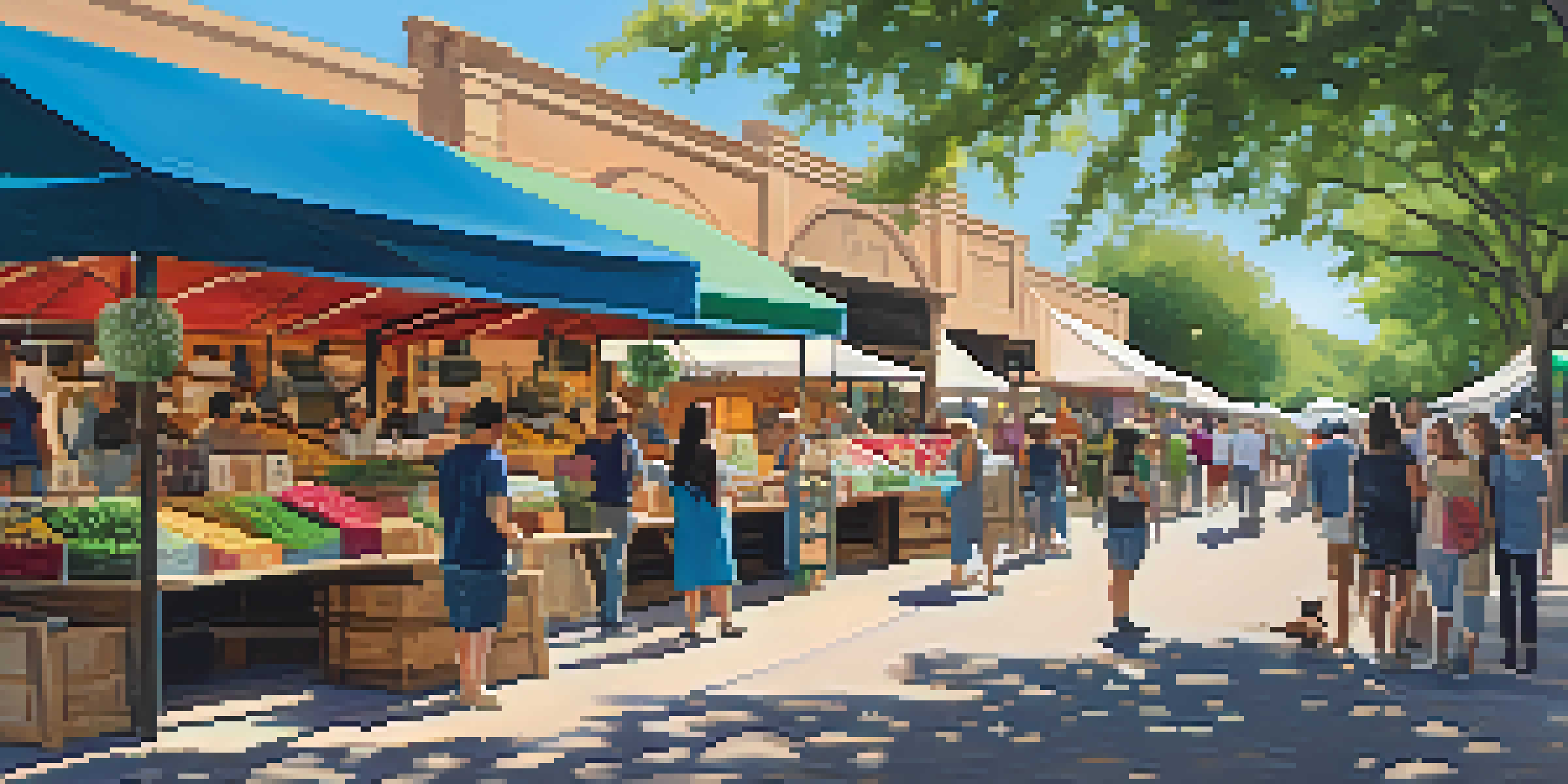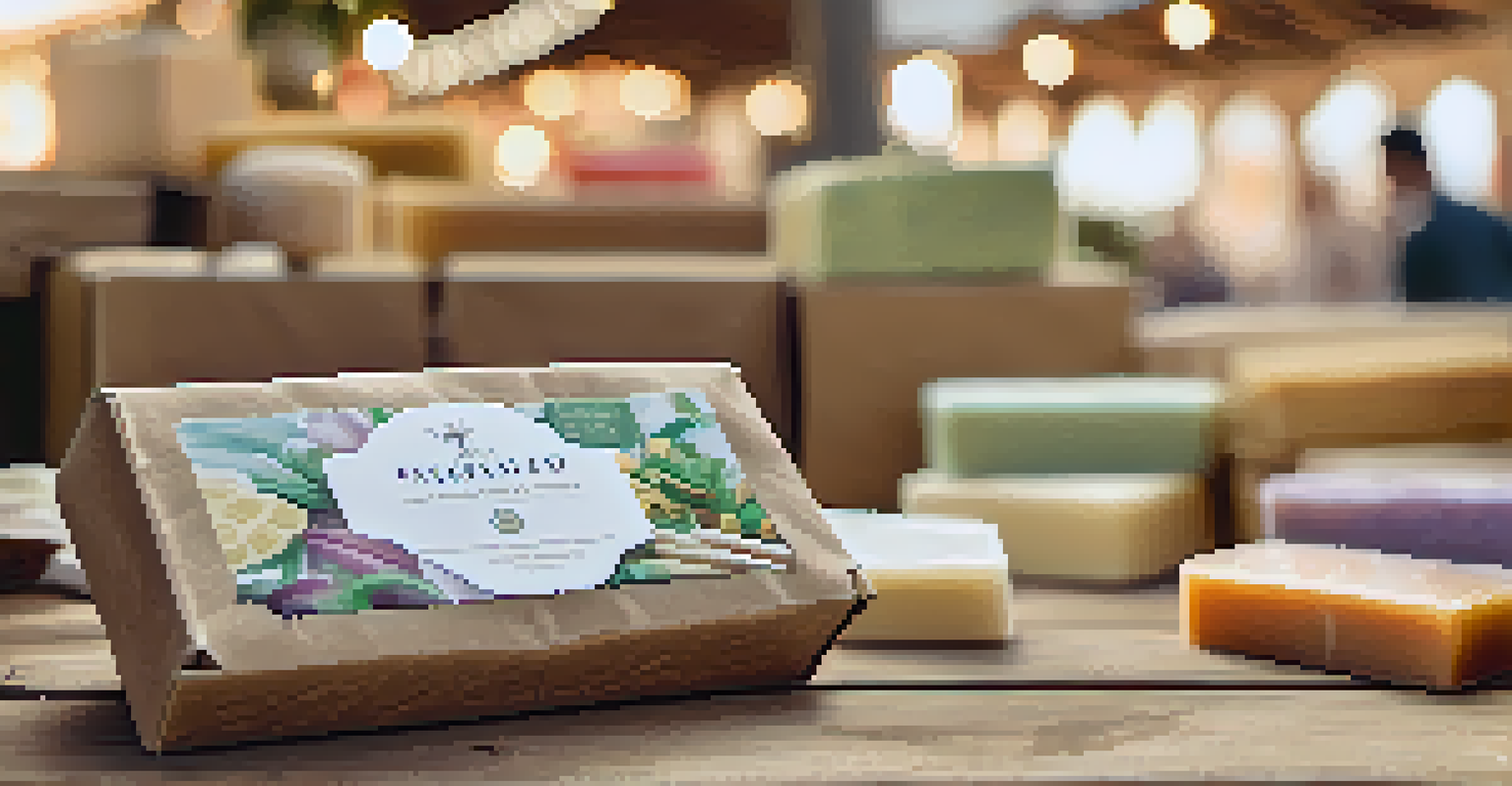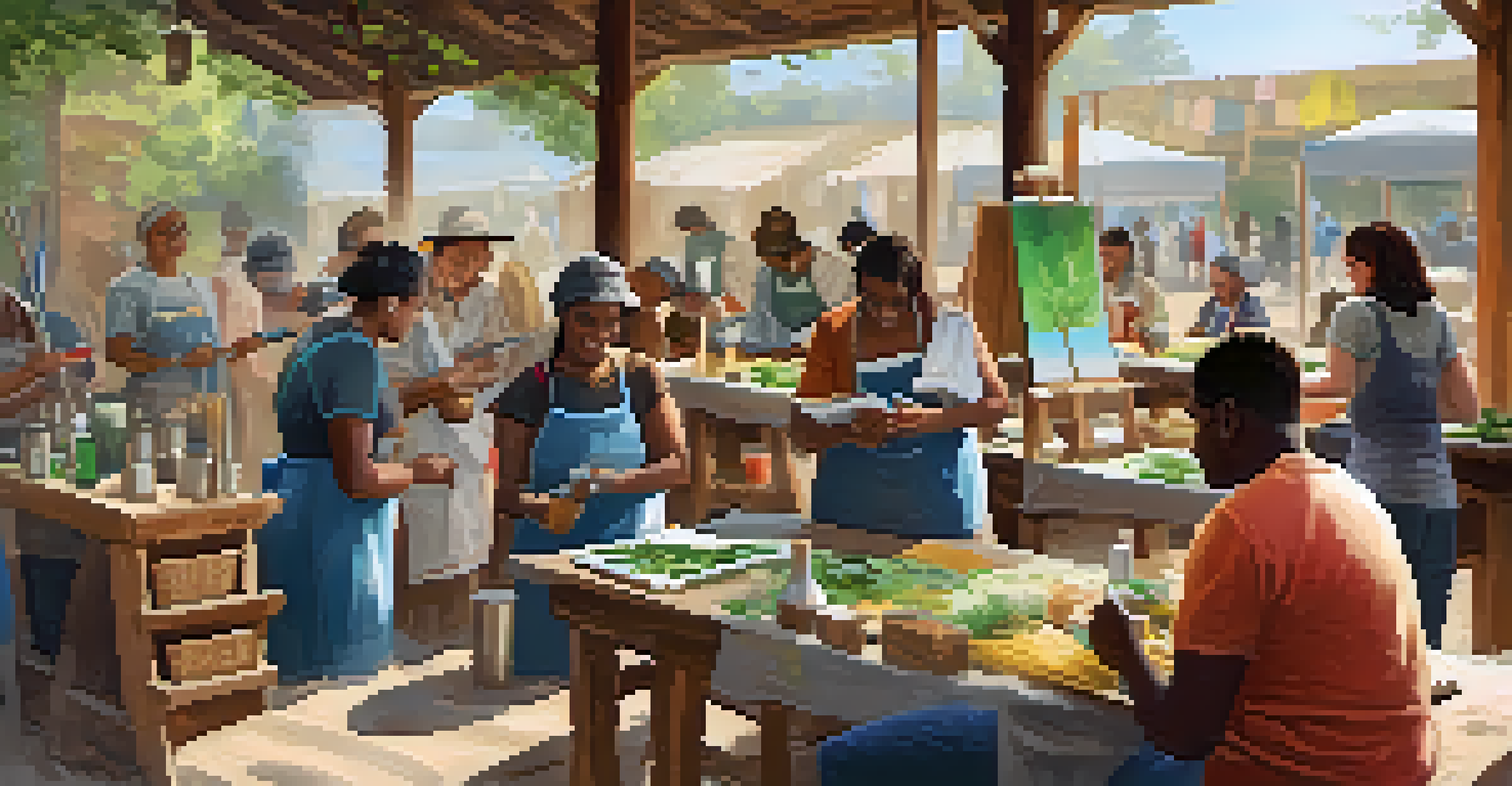Sustainable Practices in Austin's Artisan Markets

The Rise of Artisan Markets in Austin
Austin has become a hub for artisan markets, showcasing local crafts and foods. These markets not only highlight unique products but also foster a sense of community and support for local businesses. As more consumers seek sustainable options, artisan markets have positioned themselves as environmentally friendly alternatives to big-box stores.
Sustainability is no longer about doing less harm. It’s about doing more good.
Many artisans are committed to eco-friendly practices, from sourcing materials to packaging. This dedication attracts environmentally conscious shoppers who want to make mindful purchases. As these markets grow, they serve as a platform for promoting sustainability in the local economy.
The vibrant atmosphere of these markets allows for meaningful connections between artisans and customers. Shoppers are often eager to learn about the stories behind the products, creating a deeper appreciation for sustainable practices. This engagement helps to spread awareness about the importance of supporting local artisans and sustainable choices.
Sourcing Local and Sustainable Materials
One of the key features of Austin's artisan markets is the emphasis on local sourcing. Many artisans use materials that are grown or produced within the region, reducing transportation emissions and supporting local economies. This practice not only benefits the environment but also strengthens community ties.

For example, local textile artists often choose organic cotton or recycled fabrics, which lessen the impact on the planet. By prioritizing sustainable materials, these artisans contribute to a circular economy, where waste is minimized, and resources are reused. This approach is a win-win for both creators and consumers.
Support for Local Artisans Grows
Austin's artisan markets foster community by showcasing local crafts and foods, creating a sense of connection among consumers and producers.
Moreover, shoppers are increasingly drawn to the stories behind the materials used in their purchases. When customers understand that their favorite artisan uses sustainably sourced materials, it fosters a sense of pride and responsibility. It encourages them to think critically about their buying habits and the environmental impact of their choices.
Eco-Friendly Packaging Solutions
Another essential aspect of sustainability in Austin's artisan markets is packaging. Many artisans are ditching plastic and opting for biodegradable or recyclable materials. This shift not only reduces waste but also aligns with the values of eco-conscious consumers who prioritize sustainability.
The greatest threat to our planet is the belief that someone else will save it.
For instance, you might find handmade soaps wrapped in recycled paper instead of plastic, which adds a personal touch while being kind to the Earth. Artisans often encourage customers to bring their reusable bags or containers, further minimizing single-use waste. This initiative helps cultivate a culture of sustainability among market-goers.
By choosing eco-friendly packaging, artisans make a statement about their commitment to the environment. This not only appeals to environmentally minded shoppers but also sets a standard for other businesses. As more artisans adopt these practices, it inspires an industry-wide shift towards sustainable packaging options.
Waste Reduction and Recycling Initiatives
Austin's artisan markets are increasingly implementing waste reduction and recycling initiatives. Many market organizers encourage vendors to minimize waste by providing compost bins and recycling stations. This effort not only keeps the markets clean but also raises awareness about responsible waste disposal among attendees.
Artisans are also finding creative ways to repurpose leftover materials. For example, leftover fabric scraps can become beautiful patchwork items, turning potential waste into new products. This resourcefulness not only reduces waste but also showcases the artisans' commitment to sustainability.
Sustainability Takes Center Stage
Artisans prioritize eco-friendly practices, from sourcing materials to packaging, appealing to environmentally conscious shoppers.
Additionally, some markets host workshops on waste reduction and recycling practices. These events educate attendees on how to make sustainable choices in their daily lives. By fostering an environment of learning and engagement, these markets contribute to a more sustainable community.
Supporting Local Farmers and Food Producers
A significant draw of artisan markets in Austin is their focus on local food producers. Many vendors collaborate with local farmers to create fresh, seasonal dishes that highlight the region's agricultural bounty. This relationship not only supports local economies but also promotes sustainable farming practices.
For instance, you might find food stalls that serve dishes made from organic, locally sourced ingredients. This approach reduces the carbon footprint associated with transporting food over long distances and encourages consumers to eat seasonally. It also educates shoppers about the benefits of supporting local agriculture.
By prioritizing local food sources, artisan markets foster a sense of community and connection between consumers and producers. Shoppers can engage directly with farmers, learning about their farming practices and the importance of sustainable agriculture. This interaction enriches the market experience and promotes a culture of sustainability.
Community Engagement and Education
Community engagement plays a crucial role in sustainability efforts at artisan markets. Many markets host events, workshops, and demonstrations that educate attendees about sustainable practices. These activities not only inform consumers but also empower them to make eco-friendly choices in their everyday lives.
For example, a workshop on DIY natural cleaning products can inspire attendees to reduce their reliance on chemical-laden products. By providing practical tips and hands-on experiences, these markets foster a culture of sustainability beyond the market itself. This ripple effect encourages more people to adopt sustainable practices in their homes.
Education Drives Sustainable Choices
Workshops and community engagement at artisan markets empower consumers to adopt sustainable practices in their daily lives.
Moreover, community engagement strengthens the bond between artisans and shoppers. When attendees feel connected to the community and the artisans, they are more likely to support their efforts. This connection amplifies the impact of sustainability initiatives and contributes to a greener future for Austin.
The Future of Sustainability in Artisan Markets
As Austin's artisan markets continue to grow, the future of sustainability looks promising. With an increasing number of artisans committed to eco-friendly practices, these markets are becoming a beacon of sustainability in the community. The focus on local sourcing, waste reduction, and community engagement sets a strong foundation for continued progress.
Moreover, consumer demand for sustainable products is on the rise. As shoppers become more aware of environmental issues, they seek out markets that align with their values. This trend not only benefits artisans but also encourages more businesses to adopt sustainable practices, creating a positive cycle of change.

Looking ahead, it’s clear that Austin's artisan markets will play a pivotal role in shaping a sustainable future. By prioritizing sustainability and fostering community connections, these markets are not just places to shop—they are vital hubs for promoting environmental responsibility and local culture.